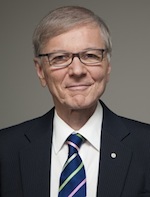

Finding opportunities for growth in markets worldwide

The Messer Group, which was established in 1898, is the largest privately managed specialist in industrial, medical, food and special gases. Under the brand "Messer – Gases for Life", the company is active in 30 countries in Europe and Asia, as well as in Peru, Algeria and New Zealand. We spoke with CEO Stefan Messer to learn more about Messer's history, its status as an international company, and the importance of innovation and recruiting talented new employees.
GSC: The Messer Group boasts an impressive, expansive history covering more than 100 years of involvement in the realm of industrial gases. The company experienced some financial and leadership uncertainty from the 1990s to the early 2000s, but since then Messer has clearly demonstrated that it is indeed a global market leader, boasting annual sales of more than 1 billion euros. Based on this transition from tumult into sustainable growth, what "lessons learned" could Messer share for other businesses in terms of finding success and sustainability both at home and internationally?
Stefan Messer: Opportunities for the Messer Group arise from various possible applications of industrial gases during the production process of a wide variety of products used in the course of everyday life. Our broad customer base and diversified product portfolio also puts us in a position to master an overall weak economic situation and to not lose sight of our long-term goals. In recent years, we have invested 1,661 million euros in the expansion of our production capacity and sales resources. Hereby we seize the opportunity to respond to increasing competition and maintain our market position as well as to expand. We capitalize on the opportunities that arise from internationalization by playing a role in the positive development of emerging economies, especially within the EU's eastward enlargement, through purposeful expansion of our facilities in those countries. Through this, we are also able to access new markets with long-term growth potential. By anchoring the motivation of our employees in our values and the management of ideas, we promote at the same time the recognition of such opportunities.
GSC: Your condensed mission statement says that Messer is focused on doing business in the European and Chinese markets. Why is the Chinese region so important to Messer? What has been the company's experience thus far doing business there, in terms of challenges and successes?
Stefan Messer: In 1997, Messer began its business activities in China. In order to facilitate the management of this branch as well as for the benefit of additional business developments, Messer established its Chinese headquarters in Shanghai. In the early years, the most important foundation of the business was an industrial gases joint venture with the Valin Group in the steel sector of Hunan. This company became Messer's largest single company in China. Of course, there were large initial difficulties to overcome before a solid management team was established and the partnerships were cemented. Not every single decision was correct, and some errors, such as investment decisions, had to be acknowledged and corrected. After the Messer family took over the business in 2004, China was confirmed as a strategic focus, and previously dormant expansion efforts in China were restarted. Following this, there was a decade of rapid investment and major economic success within the upturn of the Chinese economy. Several new locations were opened, and existing partnerships were expanded. Recently, multiple new facilities have started production or are currently under construction. Sales have increased from 40 million euros (2004) to approximately 400 million euros (2012). Today, nearly 2,000 employees work for Messer in China, and the country now plays a key role for the company. As such, we have never had a reason to regret our entry in the Chinese market.
GSC: Many observers of global economic trends have identified Turkey as a strong emerging economy with a great deal of potential for investors -- some even group them in as a member of the new "BRIC" economies, referred to as MINT economies (Mexico, Indonesia, Nigeria and Turkey). What involvement does Messer currently have in the Turkish market, and what role do you see Turkey playing in Messer's plans for the future?
Stefan Messer: In Turkey, Messer has 68 employees. They have produced sales of around eight million euros in 2013. This corresponds to a growth rate of circa five percent. We produce, fill and market gases at four different locations in Turkey, primarily for the automotive, construction, metal, glass and ceramic industries.
The focus of our economic development in Turkey is the utilization of the recently created production capacities. Any future investment decisions that we will make will be consistent with a medium-term net debt consolidation.
GSC: When it comes to innovation, Messer has established various "technical competence centers" across Germany, Austria, Switzerland and France, where Messer experts as well as academics can work with Messer's customers to test out new technologies and further the advancement of technological innovation in the industrial gases sector. How does bringing members from these different areas (Messer, academia, the customer base) together impact the innovation process at Messer? What value does this bring?
Stefan Messer: With our continued efforts in the fields of research and development as well as in the realm of constant innovation, we are following the established set of values of our company. Innovative processes and possible applications of our gas products should offer our customers added value and should differentiate Messer from its competitors. Messer holds a total of about 800 patents and 160 patent complexes. Each year, there are around 20 new patent complexes.
The focus of the development of application technologies is our customers' processes and procedures. Ideas which show the potential for optimization through the use of gases are therefore implemented in close cooperation with our customers and partners. This enables a needs-based development and rapid implementation in the market.
Industrial gases, specialty gases and food gases are regularly used when no other environmentally friendly or cost-effective alternatives for process and procedure optimization are available for the customer. In the food industry, for example, goods are only frozen with nitrogen when the cryogenic process offers more advantages, such as faster freezing times, than is offered by freezing something mechanically. Therefore, Messer strives to continuously improve customer applications of gases in order to promote long-lasting customer loyalty as a partner of Messer. The customer then determines the performance of Messer based on the economic and resource-saving advantages provided through the use of gases, and not just on the price of the gas used.
GSC: Messer is also involved in the support of outstanding and talented young persons involved in the field of business and technology. For example, earlier this year the Hans Messer Prize was awarded to two promising graduates from the Fachhochschule Frankfurt am Main. How important is it for the company's status as an international innovator to find and recruit talented young professionals to join the company?
Stefan Messer: Messer currently implements a transnational, unified employer brand that reflects its corporate culture and this makes it easy to quickly understand the essence of the company. On the one hand, you want to achieve a stronger bonding of new and existing employees in the company through this way, but on the other hand, you also want to inspire potential employees who will work for us, our products and our solutions.
The Messer Group is particularly active in the education and training of young people, because the younger generation is an important investment in our company's competitiveness and efficiency. In Germany, we offer training for graduates as industry businesspersons, mechatronics, IT salespersons and IT technicians. The training takes place at various locations, sometimes including several weeks abroad.
The Academy Messer Group was launched as an extension of our portfolio of systematic staff development efforts. It offers various training courses and lectures. Every fall, lectures for our managers and junior executives are held. In the spring of 2013, the Junior Circle started with 18 participants from various subsidiaries and departments. This group focuses on knowledge transfer by our experts from different areas of the company. The conceptual structure provides for five one-week modules with different emphases as well as intercultural training for aspiring managers. The focus is on the presentation of a practical and comprehensive overview of our products, technical solutions, structures and specific internal issues. With this undertaking, a chief concern is the gathering of a good network of participants. For about 380 employees at Messer, the company establishes concrete training plans; the remaining employees are overseen by the local HR department. In any case, training needs are evaluated once a year through staff interviews.
GSC: Thank you very much for your time, Mr. Messer.
More information: www.messergroup.com
